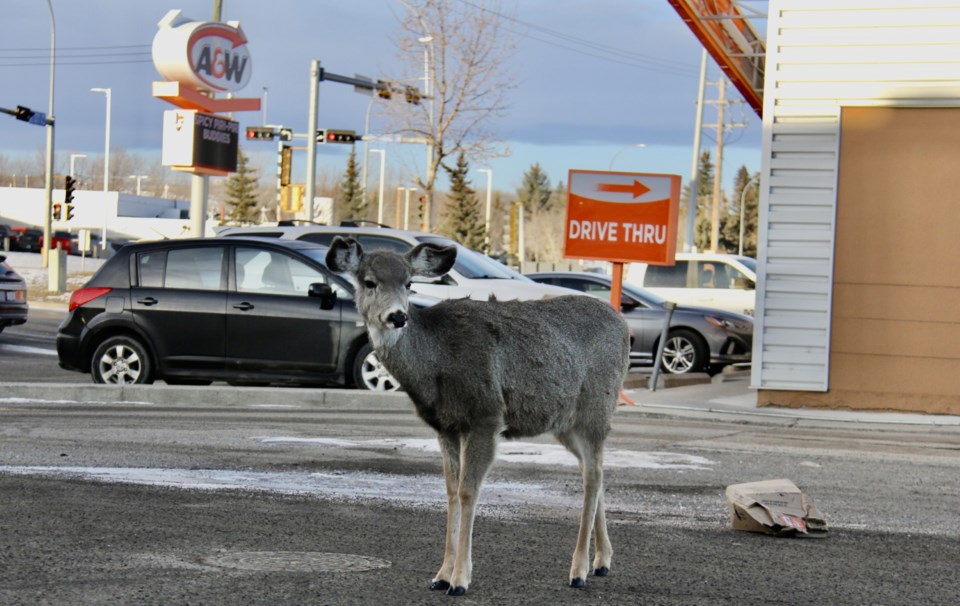Southern Alberta municipal governments are joining forces to find a solution for their growing urban deer populations.
The newly-formed group is dubbed the Municipal Conflict Wildlife Collaborative Calgary Area, or MCWC-CA, and its membership of 10 municipalities is composed of representatives from Okotoks, Diamond Valley, Calgary, Airdrie, Canmore, Cochrane, Chestermere, Rocky View County, Wheatland County and the Municipal District of Bighorn.
Representatives from the provincial government will sit at the meetings as well.
In an interview with the Western Wheel, Craig Beaton, Town of Diamond Valley operations manager, shared details about the new group, which has yet to be officially announced.
"Our vision here is to bring together like-minded government representatives to share ideas, collaborate in solutions and support others to develop best practices for addressing conflict wildlife in the communities," said Beaton.
The group was started when representatives from Airdrie got in touch with nearby communities such as Okotoks and Diamond Valley.
"We all seem to have concerns and issues in the south Calgary region with wildlife," said Beaton. "We're dealing with the same issues around deer, bears and cougars.
"It was established that we'd be interested in creating a bit of a collective in the south Calgary region."
Beaton said that through the collective, municipalities will be able to more effectively work with Alberta Fish and Wildlife and other provincial bodies.
"I don't think that [Alberta Fish and Wildlife] is really the resource that [the Town of Diamond Valley] would be looking to rely on," said Beaton, citing difficulties the Town has had communicating with the agency in the past.
"However, I think maybe as a collective that, if there was something the collective felt was important, I believe as a collective if we approach the Province, that might have a lot more weight than individual municipalities trying to get that message across."
The group will additionally focus on environmental issues such as mild winters, but one of its primary and most in-demand focus areas will be urban deer populations.
"I know it's a very sensitive area for so many reasons," said Beaton. "A lot of people love the deer and you know, a lot of people travel into rural areas and love seeing the deer, and then you've got those that are affected in a negative way by the deer."
The group was first publicly mentioned during a Diamond Valley council meeting on Feb. 21.
"We're having a collaborative conversation around ideas, more of a think tank and a process," said Beaton during the meeting. "We do have officials from the government there, so we are looking forward to working together to find a solution that might be less dramatic with the problem."
Council unanimously passed a motion to receive quarterly updates from the collective, amid growing demand for a solution to urban deer populations in the Foothills.
Primary concerns over deer populations in towns like Diamond Valley revolve around their potential to attract predators such as cougars and coyotes to town and to spread chronic wasting disease, along with their characterization as destructive pests by many residents.
Numerous Foothills residents have advocated for a cull, prompting council discussion.
Beaton said the Town of Diamond Valley will not cull deer, nor will it consider the idea.
"I think we all want to just find a solution that will help our communities and our residents," he said. "Honestly, culling animals is not the solution."
Beaton believes many other options are available.
"Removing food sources for wildlife, not giving them access to bird feeders, planting materials inside your yard versus outside or around the house where dear love to bed," said Beaton. "Putting a bunch of smart people in a room... the MCWC-CA should generate even more ideas."
Beaton said the group also aims to promote public education, including raising awareness on laws against feeding wildlife and training sessions with residents about discouraging deer from living in urban areas.
The collective's first meeting will be held on Feb. 27. No information has been officially shared yet, but Beaton said there might be opportunities for public participation in the future.




